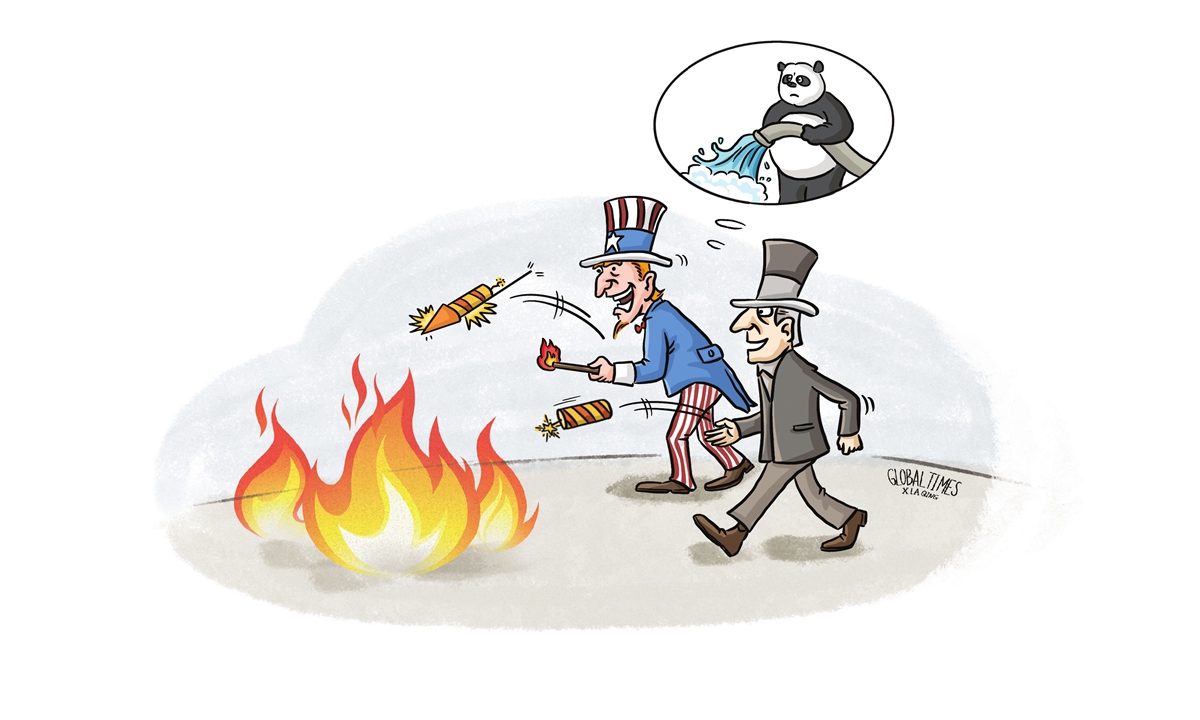
The instigators. Illustration: Xia Qing/GT
When addressing a meeting of foreign ministers of G7 in Japan on Sunday, EU Foreign Policy Chief Josep Borrell said that China can play a role in the Russia-Ukraine conflict by talking directly to Ukraine while refraining from any military activity. This is a representative voice of the West in asking China to end the war the West has sponsored and provoked.
Borrell continued that China could contribute "by neutrality" as "a permanent member of the United Nations" while having "close relations with Russia." Since the Russia-Ukraine conflict broke out, some Western politicians and media outlets have continually hyped up in the manner of a presumption of guilt that China supports Russia. Because of their bias, some European leaders' have voiced out loud that they hope China could play the role of a "neutral" peace mediator based on their standard.
On the other hand, such narratives also mirror Europe's helplessness in dealing with the Russia-Ukraine conflict. Europe is now eager to see the end to the conflict. The entire Europe has gradually realized that they have fallen into the geopolitical trap set by Washington.
As a direct result, Europe's economy has stagnated. The World Bank cut its growth outlook for Europe from 1.5 percent to 0.1 percent. A large amount of funds and technology have flowed from Europe to the US. Although it is now spring, many European leaders have felt the arrival of an economic winter.
Additionally, after more than a year of the Ukraine crisis, the bilateral relations between Russia and Europe have been disrupted. Europe has fallen into the US strategic framework, and they have lost the capability to tackle the Russia-Ukraine conflict.
There are fundamental differences in the basic positions, principles, and practices in terms of the ongoing Russia-Ukraine conflict between China and the West led by the US. The Russia-Ukraine conflict is, to a large extent, a long-planned means of the US-led NATO, to provoke a geopolitical crisis in Europe through unrestrained eastward expansion. Its essence is to enhance US control and influence over Europe on the basis of disrupting Russia-Europe bilateral relations. Up to now, the NATO is still fanning the flames.
Moreover, in the short term, it is anticipated that Russia-Ukraine conflict will not be resolved with a peaceful solution. This is because Washington will certainly continue to hamper the process of peace talks for its own interests. Till now, it can be said that the US is the biggest beneficiary of the Russia-Ukraine conflict and naturally it will not agree to any peace proposals by China, Europe and other countries.
In contrast, China's position on the Russia-Ukraine conflict has been consistent and clear-cut since its outbreak more than a year ago. Upholding the principle of promoting peace talks, China always believes that the geopolitical crisis in Europe should be resolved through peaceful dialogue, and opposes all forms of hegemonism and power politics. On this basis, China's Position on the Political Settlement of the Ukraine Crisis was put forward on February 24. It is self-evident which the morally responsible party on peace in Ukraine is.
China stands ready to promote peaceful negotiations between Russian and Ukraine, which is no contradictory with the development of its bilateral relations with Russia. China is also willing to develop and consolidate bilateral relations with the EU based on the principle of a multipolar world.
But the attempt of any country or international organization to impose its will and strategy on China will not be accepted. The so-called expectations of some European leaders regarding the Russia-Ukraine conflict are essentially imposing their own will on China to some extent. This is unacceptable under the current political and international situation.
Even though China-EU relations have turned a positive momentum, there are still some European politicians who uphold a cold war mentality. In this way, they can never objectively look at the current geopolitical situation in Europe or understand the basic principles and positions of Chinese diplomacy. This is not conducive to Europe's emergence from a mess of political, economic and cultural crises brought about by the Ukraine crisis.
The author is a scholar at Shanghai International Studies University. opinion@globaltimes.com.cn

